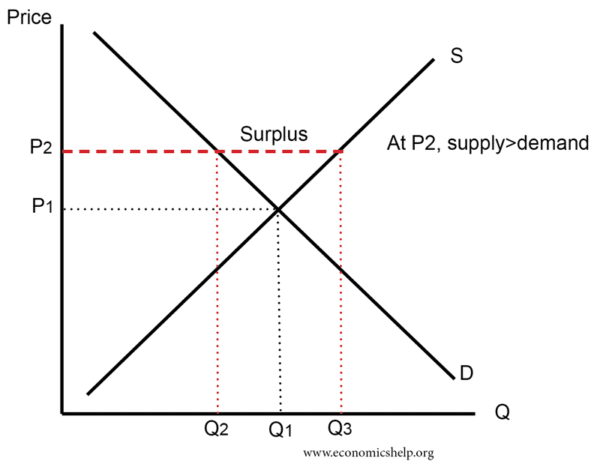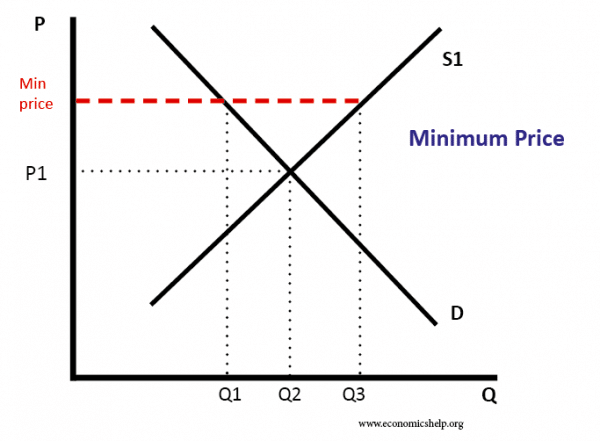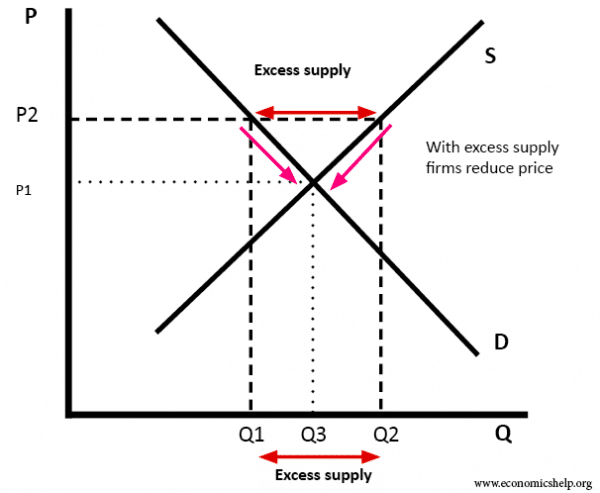Definition
A surplus occurs when the amount of a good or assets exceeds the quantity actively used. If a firm supplies one 1,000 Christmas Trees, but there is demand for only 400, then it will have a surplus of 600 unsold Christmas Trees.

Other types of surplus
- Consumer surplus – When a consumer’s marginal utility exceeds the price.
- Producer surplus – When a firm receives a price in excess of the price it would be willing to supply at.
- Budget surplus – When revenue exceeds expenditure.

Causes of surplus
- Sudden change in demand. In a free market, a firm could be left with a surplus, if there is a sudden change in market demand. For example, during the Covid Lockdown train firms were left with surplus train seats as travel fell 90%.
- Government support. In global markets, there was a significant surplus of steel because China increased output and other firms were slower to cut back on production. Some government’s offered public support for national steel companies, so supply was kept artificially high.
- Market penetration. A firm may wish to ‘flood’ the market with supply in order to gain market share and push rival firms out of business. For a short time, the supply may be greater than the willingness to buy
- Price/wage rigidity. In a free market, we would expect a surplus to be solved by cutting prices – leading to lower demand and less incentive to supply. However, prices may be rigid and not fall because of difficulties or unwillingness to cut prices. For example, if ticket prices are set, and the show is unpopular, it is unlikely the theatre will cut prices but instead accepts surplus seats.
- Minimum prices. For many years the EEC/EU had minimum prices for certain food products with the aim of increasing farmers’ incomes. However, this guaranteed minimum encouraged farmers to supply more, leading to large surpluses. (They were nicknamed things like butter mountains, wine lakes)
- Command economy. In the Soviet Union goods were distributed by a centrally planned authority rather than markets. A central bureaucracy gave orders of what to produce, but there was no guarantee that these orders met what people wanted. If often led to surplus (and shortages) or different types of goods.
Effects of a surplus
- Inefficiency. A surplus represents allocative inefficiency. Goods and services are not being distributed according to consumer preferences. There could be a Pareto improvement by reducing supply and shifting resources to areas where there is greater demand.
- Stocks. On the other hand a surplus could be beneficial if the good can be stored. For example, if farmers have a surplus of wheat, it can be stored and preserved for future years. Then if there is a bad harvest then the surplus from previous years can be used. However, if the good is perishable like fruit and vegetables then the surplus is likely to be wasted.
- Prices should fall. If there is a flexible market, prices should fall to equilibrium and over time the surplus should be reduced.
- Increased monopoly power? If the surplus is caused by a new firm radically increasing supply, then in the short-term consumers may benefit from lower prices. However, a prolonged surplus could cause smaller firms to go out of business and in the long-term, it could lead to increased monopoly power and higher prices.
Related


